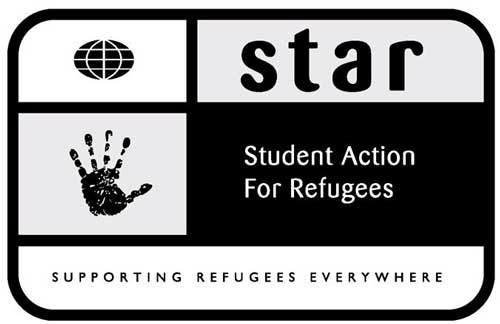Today
marks the start of Refugee Week, a week that aims to recognise the plight and
needs of refugees around the world: Zimbabweans, Iranians, Afghanis, Eritreans,
Chinese, Bosnians. Groups across the globe such as Amnesty International,
Refugee Council, UNHCR and Refugee Action work tirelessly to secure, support
and integrate the needs of refugees into the societies of our home countries.
Yet among the fundraising activities and awareness campaigns that scream “We
are here and we are growing by the day” an unmistakable disengagement with
these issues is being passed through our national politics.
While
our local and international media spins news headlines of European economic
downfalls into double dips and grieves the costly interventions into the
‘failed’ states of the Middle East, our thoughts are almost forcibly pulled
away from an indisputably linked and ever amplifying problem of displaced
peoples.
Even
more troubling is the passivity and discrimination that guards our government’s
disengagement with refugee rights. Over the last 20 years our media and society
itself has used the refugees and asylum seekers as all-purpose scapegoats. For
example in recent economic plight as ‘benefit leeches’. Or even as the cultural
stereotypes and political playdough of our century, blowing a wave of malignant
discrimination over Muslim asylum seeking communities as ‘Radical Islamists’. Of
course this is nothing new, minorities no matter where in the world have
historically been used to justify discrimination and ignorance.
What
is new however, is our societies growing disengagement with these individuals
as human cases, our passivity to uninformed, discriminative media and the
consequential endowment of our national break with refugee rights, human
rights, and the international laws set by the 1951 UN conference.
During
a Refugee Action workshop on Refugee and Asylum seekers in Britain even a room
of engaged university refugee volunteers had problems picking out the
definition between an asylum seeker, a refugee, or an ‘illegal migrant claiming
asylum status’. In fact they are all part of the same process. The vocabulary
of ‘Illegal’ and ‘claiming’ are merely words that we are used to associating
with the idea of asylum seekers and refugees, that they might be falsehoods, or
undeserving of refugee status. No one claiming torture, disaster or any threat
to their livelihood as a reason to gain residence is ever illegal. No one
chooses to be a refugee.
Likewise,
we are also used to hearing of the drastically and damagingly high numbers of
refugees that we accept into our country. In fact countries such as Pakistan,
Syria and Iran house more refugees than Britain. Of the 22,000 individuals that
applied for asylum in 2010, Britain’s quota is merely 700. Last year Britain didn’t even meet its quota due to high amounts of forced deportation and the
overturning of appeals in court. Consequently the UK holds only 2% of the world’s
refugee community. Media also tends to ignore the fact that many asylum
seekers that are forcibly removed and are claiming human rights violations are
under the age of 20 or 18. For instance
in 2010 a 1/4 of refugees and asylum seekers that contacted the One Stop Service
provided by Refugee Action were under 26.
In
reference to economic refugee ‘hear-say’, it costs £17,000 to deport a single adult asylum seeker, yet asylum seekers are awarded a meagre sum of £36.62 a
week and are unable to claim mainstream benefits. Many refugees come across to
host countries having lost a lifetime of qualifications and career prospects.
Interestingly enough to support a refugee doctor costs only £25,000 while
training a doctor from scratch costs £200-250,000. In fact refugee communities
and individuals are statistically more likely to pay into public funds than the
standard citizen.
Still
refugee and asylum rights are dwindling in the UK. Of 520,000 Sudanese refugees
in 2008 only 265 applied through the asylum seeker process in the UK. And it is
not surprising, no longer is our country providing for the human consequences
of many of our international political relations and interventions. Instead
cuts now mirror social unawareness. Refugee Action whom work alongside numerous
other refugee and asylum seeker service organisations have suffered incredible cuts
including a 100% cut to their Integration and Employment Service that will
fully be set in motion by 2013 .
If
refugees are unable to integrate or gain jobs are we not merely writing them
off as a society altogether?
During
this week it is not only vital to remember to celebrate and campaign for the
awareness of the existence of refugees but also to critically challenge our
society’s disengagement, and thus our government’s disengagement with refugee
rights. It is perhaps easy to forget, surrounded by headlines of Economic
downfalls and regional intervention, that there is still 15 million and a half
individuals that look to us to uphold their rights to continue as humans
despite the existence of conflict, disaster, and intervention.
To
look into Refugee Actions Work and Refugee Week events see: http://www.refugee-action.org/
Or
to join your local STAR network and engage during Refugee Week visit: http://www.star-network.org.uk/
For
further action and articles on hostility and disengagement to Refugee and
Asylum seeker rights see Amnesty International’s launch of ‘When You Don’t
Exist’ campaign that launched one week prior to Refugee week: http://whenyoudontexist.eu






